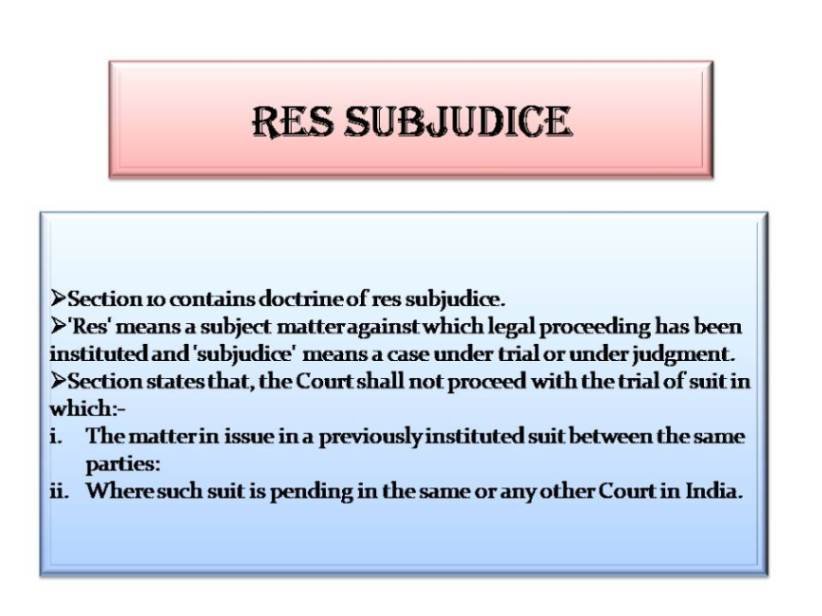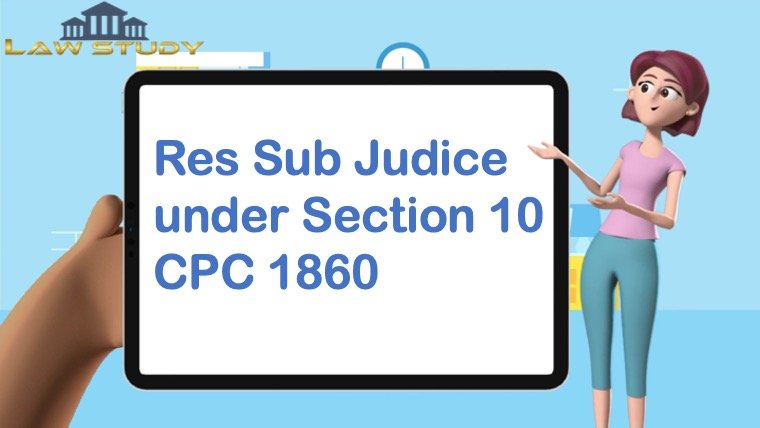Introduction of the Res Sub Judice under Section 10 CPC 1860: Res Sub Judicata is a Latin phrase that means “Under Judgment.” The sub-judice rule is related to general public policy, and it prohibits the applicant from filing two simultaneous lawsuits on the same subject matter, reducing the possibility of two courts issuing contradictory court decisions.
The concept of Res Sub Judicata persists to avert duplicate litigation & two seemingly contradictory decisions. The theory prevents a parallel trial in a case if the case is still being adjudicated in the other. Even so, it has no direct effect on how the following litigation is filed.

The Rule of Res Sub Judice Originated
We were unable to discover the primary source for the doctrine of Res Sub Judice. The regulation’s origins can be traced directly to Roman law. The notion of exception rei judicatae, which means “previous judgment” in Roman law, gave rise to this concept.
The Hindu and Muslim jurists recognized the significance of this law throughout ancient history. In Hindu ancient law, the Purva Nyaya, or earlier Judgment, was the ruling of the sub judice.
The objective of Section 10
- To prevent simultaneous litigation in two different courts over the same issue between the same parties.
- To avoid making two contradicting decisions on the same issue
- To lighten the load on the courts
- To safeguard the other party’s rights.
- In order to avoid excessive delays.
The Scope of Section 10
Section 10’s scope is obvious, unequivocal, definitive, and obligatory. The provision’s word ‘shall’ makes it obligatory. Section 10 does not necessarily that the subject matter of two lawsuits be the same, but it does require that the subject matter be directly or substantially the same. The court must order a stay of proceedings in order to prevent the proceedings from becoming municipalized and the parties from being harassed.
Only a stay of proceedings, not a dismissal, is permitted under Section 10. In execution proceedings, a court order issued in violation of Section 10 is not void.
Section 10 Essentials Elements
- There are two suits required.
- The lawsuits must be brought by the same individuals or their heirs.
- The lawsuit’s subject must be directly and essentially the same as the previous lawsuit’s.
- Both litigation must be filed in a court proceeding.
- In both circumstances, the parties should be sued under the same title.
- If the foregoing requirements are met, the court may order a stay of proceedings under Section 10 of the CPC.
conditions for section 10
The conditions that should be fulfilled before section 10 can be applied:
Same Parties
The identification of the parties is sufficient to impose a stay under Sec.10. To apply Sec.10, it is sufficient that the suit was previously initiated by parties who claim to be disputing under the same subject.
The issue must be the same
For the purposes of applying sec. 10, it is necessary to show that the essence of the dispute in two suits is the same. The identity of the reliefs is not required for this clause to apply.
The suit must be pending
A stay of proceedings is only possible if a past suit is still pending, as stated in Section 10. The defendant owes it to the court to inform it of any earlier lawsuit that is still pending. However, if the case is proceeding in a foreign court, the Section does not apply.
The title must be the same
The litigants must be suing under the same subject in both instances in order to implement section 10.
The court should be competent
Sec. 10 of the C.P.C. only applies if the preceding litigation is still continuing in a court of competent jurisdiction.
When the court can’t apply the Res Sub Judice Doctrine?
- In Alimmllah vs. Sheikh, the court found that when the facts & issues in both lawsuits are different and separate, the rule of sub judice doesn’t apply.
- The court decided in Abdul vs. Asrafun that the doctrine does not apply if there are some common & some unique issues.
- When the individuals are the same yet have opposing issues.
- For Section 10 to apply, all of the issues in the preceding brought suit do not have to be issued in the subsequent litigation.
Is Section 10 applicable to foreign courts?
No, Foreign courts are not covered by Section 10 of the Civil Procedure Code. The fact that a lawsuit is pending in a foreign jurisdiction does not prevent the Indian law system from continuing to pursue the same cause of action.
Inherent Power to Stay
The term inherent has a broad definition that encompasses an inseparable portion of anything, as well as a permanent & necessary attribute or quality. It’s something that’s intrinsically linked to a person or thing. As a result, inherent powers are the inalienable powers of the courts, i.e., powers that cannot be divided or removed from the courts, and which they exercise in order to bring full justice to the parties.
Despite the fact that Sec.10 does not apply strictly, a civil court has the inherent power u/s 151 to stay a lawsuit in order to attain justice. In addition, courts can combine multiple lawsuits between the same parties if the subject matter is substantially the same. Bokaro & Ramgur Ltd. vs.. State of Bihar & Others (1962) was a lawsuit over property ownership. In this instance, the court exercised its authority and merged many issues involving the same subject.
Consolidation of Suits
Section 10’s purpose is to prohibit two courts from reaching different decisions in the same matter. The courts can order the two lawsuits to be combined to get around this. Consolidation of actions is decided to order under Section 151 to achieve the goals of justice because it saves the party from multiple litigation, disruptions, delays, and expenditures, as explained in Anurag & Co. Vs. A.D.J and Others. The parties are also freed from having to present identical evidence in two locations.
Contravention’s Impact
Any decree issued in contravention of Sec.10 is not void, and thus cannot be simply disregarded. It is important to note that this clause only prohibits the trial, not the filing of a subsequent lawsuit. However, parties have the option to relinquish this privilege that has been granted to them. As a result, if the parties in a lawsuit decide to surrender their rights and urge the court to move forward with the next complaint, they cannot then challenge the validity of the succeeding proceedings.
Interim/Temporary Orders
Interim/ Temporary orders are orders issued for a limited period of time before the final order is passed. The court’s ability to impose interim orders is unaffected by a stay issued under Section 10. As a result, the courts have the authority to issue interim orders such as attachment of property, injunctions, and so on.
The distinction between Res Subjudice & Res Judicata
The rule of Res Subjudice applies when an issue is pending in a court of law, but the principle of Res Judicata applies when the matter has already been decided by the court. The trial of litigation in which the issue is pending for determination in a preceding suit is barred by Res Subjudice. Res Judicata, on the other hand, forbids a suit or issue from being tried if the issue has already been settled in a previous litigation.
Conclusion
The main goal of the doctrine of res sub judice section 10 is to relieve the courts of the burden of excessive cases. In other words, it relieves parties of the burden of presenting oral or written proof or evidence twice in different courts. It also prevents contradictory decisions & makes sure that court resources are not squandered.
The court can use this authority to halt the subsequent suit. This principle protects those who attempt to abuse their rights in order to reap double benefits. In any case, the Indian judiciary is heavily burdened with cases, and if parties begin instituting cases twice, one can’t even imagine the scenario of the court system in making decisions in all such cases.

























